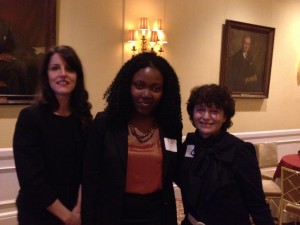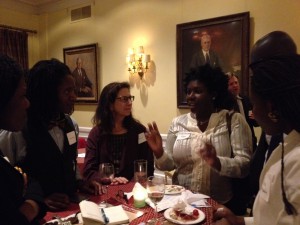“At Ashesi, my gender for the first time was not a hindrance to my progress as women were treated no differently than men. We were taught that discovering and solving problems was good and that challenging the status quo was acceptable. Ashesi taught me that mediocrity was not alright and my classmates and I were constantly sent out to find problems to solve,” Aba Ackun, ’06.
 Ashesi’s New York Event, April 3, 2014: Young Africans, Remaking Africa presentation by Aba Ackun
Ashesi’s New York Event, April 3, 2014: Young Africans, Remaking Africa presentation by Aba Ackun
“First, I want to thank all of you who took the time out of your busy schedules to be here this evening. I would also like to extend my sincerest appreciation to all of the people whose giving make the Ashesi story possible. On behalf of myself and many scholarship students who without financial assistance would not have experienced the Ashesi story, I would like to thank you.
I was very excited when the Foundation reached out to me to be a part of this event. Ashesi is and will always remain near and dear to my heart, and I am always excited to share my Ashesi story.
My name is Aba Ackun and I graduated from Ashesi in 2006. I am also a second year MBA candidate at University of Virginia’s Darden School of business. Prior to Darden, I spent 6 years after Ashesi working in leading multinational corporations that span the gold mining, financial services, and the inclusive financial services industries. I have worn safety gear and spent time with mining engineers, helping them to convert their technical plans into financial plans for capital expenditure. I have been a currency dealer, riding the highs and lows of the choppy financial markets in 2008. I have also been a part of a movement making $100 loans to micro-entrepreneurs and changing their lives through socially responsible lending. I have worked all over the West African Sub Region, Latin America, Haiti and in the United States.
I spent my MBA summer internship at a Washington DC-based impact investment fund where I helped deploy $1.2 million in capital to various debt funds and limited partnerships. Through rigorous due diligence, I built relationships with the best fund managers in social impact investing all over the globe and provided this organization with access to a strong deal flow with substantial opportunities for high returns.
But at the core of all of this, I am simply a dressmaker‘s daughter. A person who came from a working-class home where neither of my parents had gone to college. So given my station in life, when I finished high school, had Ashesi not been around, my only option would have been to attend any of the public universities whose falling standards had led many wealthy people to send their children abroad for college. Somehow my father heard about Ashesi from a friend who thought that they could offer scholarships to people like me. Thankfully, they accepted me, gave me financial aid, without which my enrollment would have been impossible, and gave me an educational experience that changed the course of my life forever.I must admit that I found Ashesi daunting at first. For the first time in my life I was being required to think critically, and for a person who had made it up to this point mainly by memorizing and regurgitating material, it was challenging. For the first time, shy and timid little old me was required to speak up, and my opinion mattered. Where I once had no opinion, I developed them, and learned how to argue my case with facts, and critical thinking. My shyness and timidity gave way to boldness, first in my written work as I explored new ideas and then into speech as I learned to present my ideas in front of the entire class. By my final year, I had held a position in the first-ever student government at Ashesi.

From left to right: Ashesi Trustee Aprile Age, Aba Ackun ’06, Ashesi Trustee Ruth Warren
At Ashesi, my gender for the first time was not a hindrance to my progress as women were treated no differently than men. We were taught that discovering and solving problems was good and that challenging the status quo was acceptable. Ashesi taught me that mediocrity was not alright and my classmates and I were constantly sent out to find problems to solve. Many years after I graduated, I shared some of my experiences with a friend who had attended a public university, and his reaction was, ‘Aba, I envy you. While we were busy memorizing, ticking boxes and shading our futures away answering multiple choice tests, you were thinking and growing.’ That statement remains with me and makes me appreciate my Ashesi experience even more.
The quality of education that I received at Ashesi was world class and I didn’t begin to fully realize its significance and worth until I entered the working world. In my first role as a business planning analyst at Newmont, which was at that time the world’s largest gold mining company, I was constantly mistaken for an expatriate: one of those Ghanaians who had studied abroad and come back to Ghana with world class skills. It was really amusing to see the confusion on my colleagues’ faces when I explained that everything I knew I had learned from a college right here in Ghana, West Africa. Within my first year there, I had won the employee recognition award twice and quickly became a mentor for junior team members who looked up to me.
After a while at the mining company, I decided to make a transition into financial services because I wanted to explore new career options. I joined Barclays and obtained my training as a currency dealer. There again, I quickly distinguished myself by completing my professional certification examinations in record time and as the first woman to do so with distinction. In all of this, Ashesi’s tenets– leadership, scholarship, and citizenship were always with me. I had to distinguish myself in these ways. It was at my currency desk that I began to see the Macroeconomic Theory that I had learned at Ashesi at work, and it was fascinating–so fascinating that it took me back to my lessons on development economics and our discussions on poverty. I assure you that at the time, few of my colleagues thought of anything other than their paychecks, but Ashesi had created certain restlessness within me. I wanted to be closer to the ground and make an impact on real lives, and so I decided to join the Microfinance movement. This was an exciting move at the time because I was going to get to work with and impact many countries beyond my own.
In my role at Accion, I led teams to deploy credit scoring tools, helped tighten internal controls, and guide risk management teams to manage the quality of their credit portfolios. These were very new concepts to the institutions I worked with, and it took a lot of effort to change attitudes. In microfinance, there are many problems to be solved, and they require creative thinking, a love for the region that you work in, and the ability to summon enthusiasm to do things like: take a bumpy ride to a cholera-stricken Haitian city to assess risks in the credit process, or prove to microfinance managers that credit scoring though new, is relevant to their industry.

Working in this role not only gave me the opportunity to build up institutions that won microfinance bank of the year awards in two countries, deploy $100 million in loans to 46,000 borrowers and help 12,000 Haitian clients to recover after the earthquake while bringing loan delinquency down below 5%; It also exposed me to a growing population of young Africans who were unsatisfied with the status quo. As I traveled through the sub-region, I met young people who were passionate about their work and were very intelligent. In places like Cameroon, young loan officers would study for and pass the CFA exam, but not be fazed by the underemployment problem. I was lucky to work with them, learn from them, and teach them what Ashesi has taught me. I was one of them, and somehow I had managed to pursue a great career, and my mere presence confirmed that they could have whatever they dreamed about. It was a joy to hear them beginning to attempt to solve problems on their own, share their opinions and not be afraid to try new initiatives.
With all of the insights I gained from microfinance, I decided to go to business school to acquire the tools that would prepare me for my next experience. I hope to build a venture of my own, a Private Equity fund that invests in and grows manufacturing businesses across Africa. I am excited about the prospect of graduating from Darden, getting some US work experience under my belt, and then heading back home to start my venture. I know that I would not have gotten this far, learned so much or grown so extensively without Ashesi, and I am thankful to the people here and abroad that made that possible.”

